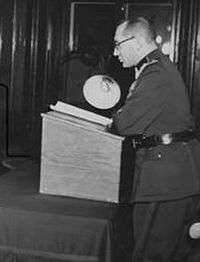Wacław Lipiński

Wacław Lipiński (1896-1949) was a Polish historian, military officer and resistance fighter, lieutenant colonel in the Polish Army of the Second Polish Republic, recipient of Polish highest military decoration, the Order of Virtuti Militari.
Life
Born on 28 September 1896 in Łódź, Lipiński became active in underground, patriotic, pro-independence Polish movements of the partition period. He started out in the scouting movement (1911), and joined the paramilitary Polish Rifle Squads (1912).[1] He was a member of the Polish Legions in World War I,[1] where he fought in the battles of Łowczówek, Konary and battle of Kostiuchnówk.[2] Then joined the precursor of the Polish intelligence, the Polish Military Organisation.[1][2] In 1918 the joined the regular Polish Army, and fought in the Polish-Ukrainian War (battle of Lwów) and then in the Polish-Soviet War (1919-1921), taking part in the Vilna offensive.[1][2]
In the interwar period, in 1927, he was promoted to major. That year he joined the newly founded Military Bureau of History (Wojskowe Biuro Historyczne).[1] In 1932 he becomes a chief editor of a publication (Niepodległość) of the Józef Piłsudski Institute for Research in Modern History of Poland, and in 1936, a director of the Institute.[1][2] From 1937 he lectured on the modern history of Poland at the University of Lwów.[1]
Promoted to lieutenant colonel and retired in January 1939.[1] After the German and Soviet invasions in September 1939, he was first attached to the Bureau of Propaganda at the Polish HQ, and then to the Propaganda Department in Warsaw, during the siege of Warsaw.[1] He was one of the top Polish commanders during that siege, working closely with Walerian Czuma and Stefan Starzyński.[1][2] He issued daily radio speeches to the citizens of Warsaw.[1] Avoiding arrest after Germans captured Warsaw, he and his family escaped, first to Zakopane later that year, and next year, to Hungary.[1][2]
Due to conflict between former followers of Józef Piłsudski (such as Lipiński) and followers of Władysław Sikorski, he was unable to join the Polish Army in the West.[2] Instead, he became active in the Piłsudskiite Polish resistance.[2] In 1942 he returned to occupied Poland, founding the Konwent Organizacji Niepodległościowych.[1][2]
In 1944 he was arrested by the Nazis. After Nazi Germans were pushed back by the Soviets, he joined the anti-Soviet resistance.[2] Founder of the Stronnictwo Niezawisłości Narodowej and Komitet Porozumiewawczy Organizacji Demokratycznych Polski Podziemnej.[1][2] He was eventually arrested by the communist secret police (Urząd Bezpieczeństwa) on 7 January 1947.[1][2] Sentenced to death in a staged trial in 1948, the sentence was changed to life sentence, he died in Wronki prison on 4 April 1949.[1][2]
Awards
- Virtuti Militari, Silver Cross
- Commander's Cross with Star of the Order of Polonia Restituta (posthumously, 2010; previously Knight's Cross)
- Cross of Independence
- Cross of Valour - twice
Works
- Bajończycy i armja polska we Francji (1929)
- Polityka zagraniczna Piłsudskiego i Becka (1943)
- Walka zbrojna o niepodległość Polski w latach 1905-1918
- Wśród lwowskich orląt
- Dziennik : wrześniowa obrona Warszawy 1939 r.
- Wielki Marszalek
See also
References
Further reading
- „Zeszyty Historyczne WiN-u”, nr 15: 2001, MATERIAŁY DO „SŁOWNIKA BIOGRAFICZNEGO UCZESTNIKÓW WALK Z KOMUNIZMEM” (Biogramy): LIPIŃSKI Wacław,= opracował Marek Gałęzowsk, p. 265-272
- Marek Gałęzowski, Wzór piłsudczyka. Wacław Lipiński 1896-1949. Żołnierz, historyk, działacz polityczny', (doktorat, 2003), NERITON Wydawnictwo, 2001, ISBN 83-88973-16-9
- Komorowski K. Sawicka I., Wacław Lipiński Żołnierz i historyk, Adiutor Oficyna Wydawnicza, 1999, ISBN 83-86100-40-0